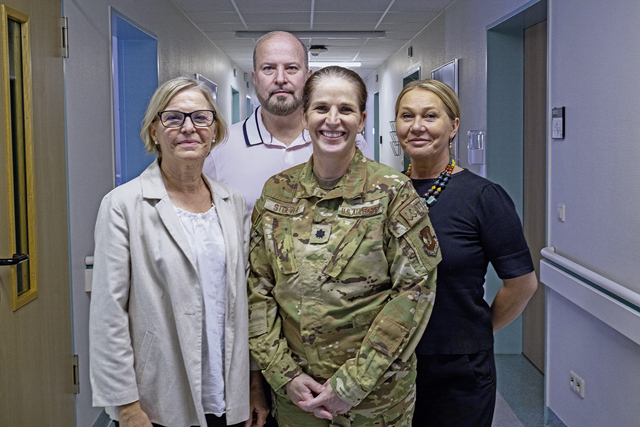
Through a rigorous and comprehensive evaluation process that spanned 14 months, the American College of Surgeons Committee on Trauma recently reverified Landstuhl Regional Medical Center as the only U.S. Level II Trauma Center, military or civilian, overseas.
This distinction will allow LRMC to continue to provide critical trauma care capability to more than 152,000 total beneficiaries, as well as more than 81,000 service members, 70,000 supported family members and civilians, and 6,000 employees and associated personnel from various overseas U.S. government agencies.
For the forward deployed warfighter, to any of four unified combatant command area of operations across three continents, LRMC is often the first stop for those in need of critical trauma care. This care dramatically reduces the risk of morbidity and mortality for those injured service members.
With a major conflict currently raging several hundred miles east of LRMC’s location, LRMC’s state-of-the-art medical capability has been extended to several Ukrainian service members who have been seriously injured in the fighting.
LRMC is also certified by the German Trauma Network as a regional Level II Trauma Center, the only U.S. medical facility that is dual-certified in the U.S. and a host nation.
As a seasoned combat trauma care provider, the stakes were high for U.S. Air Force Lt. Col. (Dr.) Mary Stuever, LRMC’s trauma medical director, and her trauma team to ensure that LRMC met the high standards of excellence expected of a Level II Trauma Center during the evaluation process by the ACS.
“When I was deployed to Afghanistan, I was a trauma medical director in a Role 3 facility,” added Stuever. “I knew that once I stabilized the patient, I could get them back to Landstuhl within 8 hours, and they would get everything that they needed. If we (LRMC) were not a Level II Trauma Center, we would essentially offer less care than some of our Role 3 hospitals.”
According to the American College of Surgeons, Level II Trauma Centers are expected to provide initial definitive trauma care for a wide range of injuries and injury severity and may take on additional responsibilities in the region related to education, system leadership, and disaster planning.
During Stuever’s deployment to Afghanistan, she was grateful for the reach back support she received from LRMC for medical consultation and feedback.
“In Afghanistan I was able to reach back to LRMC in relatively the same time zone and time of day,” Stuever added. “If I needed consultation, and it was in the middle of the night back in the U.S., you may not get someone to answer the phone. But I always called LRMC and immediately had the assistance I needed.”
Now, Stuever is providing the critical, life-saving trauma consultation to military medical assets that are forward deployed.
The thorough and protracted reverification process by the American College of Surgeons kicked off in February 2023 with the virtual site-survey that occurred Apr. 15 – 16.
“The virtual site survey covered over 100 standards and sub-standards, and over 230 attachments of protocols and measures of compliance that were uploaded to the ACS website,” said Connie Johnson, LRMC’s trauma program manager.
“Our service members are willing to put their life on the line and deploy to these combat zones. The least we can do is to make certain that they get the very best medical care that we can provide,” said Sean Kelley, LRMC’s trauma performance improvement coordinator.


